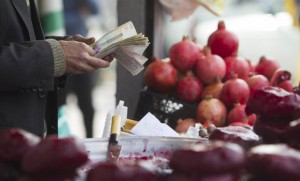 TEHRAN � Iranians rushed to supermarkets to buy cooking oil, red meat and other staples on Tuesday, stockpiling the goods over new fears of price spikes from a change in the official exchange rate that could severely reduce the already weakened purchasing power of the rial, the national currency.
TEHRAN � Iranians rushed to supermarkets to buy cooking oil, red meat and other staples on Tuesday, stockpiling the goods over new fears of price spikes from a change in the official exchange rate that could severely reduce the already weakened purchasing power of the rial, the national currency.The change, less than two months before critical national elections, appeared to cause widespread concern even among Iranians accustomed to chronically high inflation and other problems � a result, economists here say, of a combination of severe Western sanctions and what many call the government�s economic mismanagement.
Prices of staples long deemed essential are set to increase by as much as 60 percent because of the currency change, which nearly doubles the mandatory exchange rate for importers of goods like medicine, chicken and sugar, but also machinery spare parts and some chemicals.
Under�Iran�s complicated system of multiple exchange rates, the importers had been paying a rate of 12,260 rials to the dollar, but will now have to pay 24,500 rials to the dollar. The new exchange rate is much closer to the rial�s actual market value, which currency traders estimate to be 35,500 rials to the dollar.
The Iranian news media said it would take up to a week for consumers to feel the change, which appeared to accelerate many people�s efforts to buy what they could as soon as possible.
In a Sepah department store in downtown Tehran, shoppers could be seen loading dozens of bottles of cooking oil into carts.
�I�m hoarding now, so that I don�t lose money later,� explained a homemaker who identified herself by only one name, Zahra. �Again, the prices of everything will go up.�
Hassan Davari, a representative of a vegetable oil distribution company, visiting a grocery near�Palestine�Square in Tehran, found that his product had been swept off the shelves. �Any goods we have handed over to shops this morning have vanished in a couple of hours,� he said.
The value of Iran�s national currency has fallen by half over the past few years. It has been especially pummeled by the Western sanctions, which have severely curtailed Iran�s international banking capabilities and halved its overseas sales of oil, the most important Iranian export. Many economists consider the rial�s problems at least a partial cause of Iran�s inflation, which is officially around 30 percent but widely believed to be far higher.
Iran�s economics minister, Shamseddin Hosseini, acknowledged on Tuesday that inflation was a problem and that the sanctions played a role. But in a briefing for reporters while on a visit to his country�s United Nations mission in New York, Mr. Hosseini said the sanctions had also created a contrarian and beneficial result by forcing Iran to become less reliant on imports and more self-sufficient.
�We have no doubt our growth rate is positive,� he said. The imposition of sanctions, he said, �forces you to find new ways to be creative.�
The minister also said that Iranians fully supported the government�s resistance to the sanctions, imposed in response to�Iran�s nuclear energy program, which Western nations suspect is a guise for Iran to develop a nuclear weapons capability. Iran contends that the program is peaceful.
The minister maintained that the sanctions were designed to deny Iran the right to develop a broad new range of knowledge-based industries that the big Western powers would like to monopolize. New technologies, he said, �are forbidden frontiers, other than for themselves � no one else has permission to cross the threshold.�
Mr. Hosseini also disputed reports that some consumers in Iran had already found that the price of meat had doubled in the latest round of increases. �I don�t know what butcher shop they went to. They must have gotten a raw deal,� he said. �Foodstuffs have increased across the board, but not that much.�
The decision to end the preferable exchange rate for �essential� products was taken last week by the government of President�Mahmoud Ahmadinejad, which says it wants to move toward a single foreign exchange rate.
The government�s decision is likely to further weaken the rial against the dollar, experts said. But it also appeared to have some internal political motivations.
Mr. Ahmadinejad has been pressuring Parliament to increase the monthly cash distributions given to most Iranians to help cushion the blow of rising prices, which have been caused in part by his effort to phase out subsidies on food and fuels. Mr. Ahmadinejad has called his subsidy overhaul the �most successful economic plan in the history of Iran.�
But many lawmakers have resisted Mr. Ahmadinejad�s pressure, saying they would agree to increase the monthly cash distributions only after the June 14 elections, fearing that doing so beforehand could strengthen Mr. Ahmadinejad�s popularity.
The president, who has served the maximum two terms and cannot run again, appears poised to support the candidacy of his close adviser Esfandiar Rahim Mashaei, who is much hated by clerics and commanders in the security forces who fear he wants to undermine their power.
By The New York Times
The Iran Project is not responsible for the content of quoted articles.










